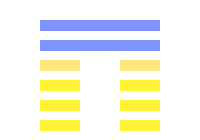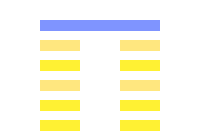20.1.2.3.5.6 (20 > 11)

20.1.2.3.5.6 (20 > 11) - THE KWÂN HEXAGRAM.
- 1. The first line, divided, shows the looking of a lad ; not blamable in men of inferior rank, but matter for regret in superior men.
- 2. The second line, divided, shows one peeping out from a door. It would be advantageous if it were (merely) the firm correctness of a female.
- 3. The third line, divided, shows one looking at (the course of) his own life, to advance or recede (accordingly).
- 5. The fifth line, undivided, shows its subject contemplating his own life(-course). A superior man, he will (thus) fall into no error.
- 6. The sixth line, undivided, shows its subject contemplating his character to see if it be indeed that of a superior man. He will not fall into error.
20.1.2.3.5.6 (20 > 11) - Selling dreams
One excels at presenting one's ideas in unexpected ways.
Bing DeepL Google Yandex20.1.2.3.5.6 (20 > 11) - Selling dreams
One excels at presenting one's ideas in unexpected ways.
Bing DeepL Google Yandex20.1.2.3.5.6 (20 > 11) - Kwèn, la contemplation
Kwèn : 1. Regarder, contempler, regard ; 2. Apparence extérieure, maintien ; 3. Gravité, dignité.
-
1. 1. (Emploi des divers sens de kwēn) : I. Un jeune garçon regardant ; maintien du jeune garçon ; non blâmé chez un homme vulgaire ; digne de blâme chez un Kiun-tze (homme élevé et sage).
C’est la manière de l’homme vulgaire. -
2. Regarder, épier d’une porte entrouverte ; ce qui est bon pour une femme. Mais cela peut attirer la honte.
Regarder une femme, d’une porte ouverte. - 3. Regarder sa propre vie (pour diriger) ses actes (ses allées et venues), (afin de ne pas perdre la voie droite.).
-
5. Contempler sa propre vie. Le Kiun-tze est par là sans reproche.
Regarder le peuple. - 6. Contempler sa vie ; le Kiun-tze est par là sans reproche.
20.1.2.3.5.6 (20 > 11) - Vendre du rêve
On excelle dans l'art de présenter ses idées de manière inattendue.
Bing DeepL Google Yandex20.1.2.3.5.6 (20 > 11) - Tekintet
- 1. Akik ismerik, megértik.
- 2. Tudnia kéne segítenie az övéinek, ahelyett hogy csak nézi őket.
- 3. Tanulni akar.
- 5. Illetékes személy után néz.
- 6. Nem akarja látni a nehézségeket.
Les trigrammes
Les trigrammes sont des combinaisons de trois traits yin et yang. Dans l'hexagramme, les trois traits du dessous constituent le trigramme inférieur et représentent la situation intérieure. Les trois lignes du haut constituent le trigramme supérieur et représentent la situation extérieure.
Trigramme supérieur : Le vent La terre


Trigramme inférieur : La terre Le ciel


La formation: 20
What is already there

20 - THE KWÂN HEXAGRAM.
Kwan shows (how he whom it represents should be like) the worshipper who has washed his hands, but not (yet) presented his offerings ;---with sincerity and an appearance of dignity (commanding reverent regard).
Bing DeepL Google Yandex20 - Kwèn, la contemplation
Kwèn : 1. Regarder, contempler, regard ; 2. Apparence extérieure, maintien ; 3. Gravité, dignité.
Texte
Maintien, gravité comme celle de quelqu’un qui est purifié et prêt à offrir le sacrifice et ne fait point l’offrande ; il est plein de droiture, de dignité sévère.
Symbolisme
Vent passant, soufflant sur la terre. Les anciens rois observaient (les caractères) des lieux et du peuple pour établir leur enseignement.
Le grand observateur (figuré par le trigramme du vent) se tient en haut lieu; l’homme bienveillant et conciliant (représenté par le trigramme de la terre) se tient au milieu pour inspecter, contempler le monde.
Commentaire
Les inférieurs le contemplent et se modèlent sur lui. Contemplant la voie spirituelle du ciel et les saisons (se succédant) sans changement, le saint s’y conforme et établit en conséquence son enseignement.

20.1 (20 > 42) - THE KWÂN HEXAGRAM.
The first line, divided, shows the looking of a lad ; not blamable in men of inferior rank, but matter for regret in superior men.
Bing DeepL Google Yandex20.1 (20 > 42) - Regretting too crafty speeches
Those who know can understand.
Bing DeepL Google Yandex20.1 (20 > 42) - Regretting too crafty speeches
Those who know can understand.
Bing DeepL Google Yandex20.1 (20 > 42) - Kwèn, la contemplation
Kwèn : 1. Regarder, contempler, regard ; 2. Apparence extérieure, maintien ; 3. Gravité, dignité.
1. (Emploi des divers sens de kwēn) : I. Un jeune garçon regardant ; maintien du jeune garçon ; non blâmé chez un homme vulgaire ; digne de blâme chez un Kiun-tze (homme élevé et sage).
C’est la manière de l’homme vulgaire.
20.1 (20 > 42) - Regretter les discours trop habiles
Ceux qui savent peuvent comprendre.
Bing DeepL Google Yandex
20.2 (20 > 59) - THE KWÂN HEXAGRAM.
The second line, divided, shows one peeping out from a door. It would be advantageous if it were (merely) the firm correctness of a female.
Bing DeepL Google Yandex20.2 (20 > 59) - Not just sitting back and watch
One should help one's kind rather than looking at them.
Bing DeepL Google Yandex20.2 (20 > 59) - Not just sitting back and watch
One should help one's kind rather than looking at them.
Bing DeepL Google Yandex20.2 (20 > 59) - Kwèn, la contemplation
Kwèn : 1. Regarder, contempler, regard ; 2. Apparence extérieure, maintien ; 3. Gravité, dignité.
Regarder, épier d’une porte entrouverte ; ce qui est bon pour une femme. Mais cela peut attirer la honte.
Regarder une femme, d’une porte ouverte.
20.2 (20 > 59) - Ne pas rester les bras croisés
On devrait aider les siens au lieu de les regarder faire.
Bing DeepL Google Yandex20.2 (20 > 59) - Tekintet
Tudnia kéne segítenie az övéinek, ahelyett hogy csak nézi őket.
Bing DeepL Google Yandex
20.3 (20 > 53) - THE KWÂN HEXAGRAM.
The third line, divided, shows one looking at (the course of) his own life, to advance or recede (accordingly).
Bing DeepL Google Yandex20.3 (20 > 53) - Kwèn, la contemplation
Kwèn : 1. Regarder, contempler, regard ; 2. Apparence extérieure, maintien ; 3. Gravité, dignité.
Regarder sa propre vie (pour diriger) ses actes (ses allées et venues), (afin de ne pas perdre la voie droite.).
Bing DeepL Google Yandex
20.5 (20 > 23) - THE KWÂN HEXAGRAM.
The fifth line, undivided, shows its subject contemplating his own life(-course). A superior man, he will (thus) fall into no error.
Bing DeepL Google Yandex20.5 (20 > 23) - Refreshing the memory
One explains to others what they already know.
Bing DeepL Google Yandex20.5 (20 > 23) - Refreshing the memory
One explains to others what they already know.
Bing DeepL Google Yandex20.5 (20 > 23) - Kwèn, la contemplation
Kwèn : 1. Regarder, contempler, regard ; 2. Apparence extérieure, maintien ; 3. Gravité, dignité.
Contempler sa propre vie. Le Kiun-tze est par là sans reproche.
Regarder le peuple.
20.5 (20 > 23) - Rafraîchir la mémoire
On explique aux autres ce qu'ils savent déjà.
Bing DeepL Google Yandex
20.6 (20 > 8) - THE KWÂN HEXAGRAM.
The sixth line, undivided, shows its subject contemplating his character to see if it be indeed that of a superior man. He will not fall into error.
Bing DeepL Google Yandex20.6 (20 > 8) - Taking care of oneself
One doesn't want to see any difficulties.
Bing DeepL Google Yandex20.6 (20 > 8) - Taking care of oneself
One doesn't want to see any difficulties.
Bing DeepL Google Yandex20.6 (20 > 8) - Kwèn, la contemplation
Kwèn : 1. Regarder, contempler, regard ; 2. Apparence extérieure, maintien ; 3. Gravité, dignité.
Contempler sa vie ; le Kiun-tze est par là sans reproche.
Bing DeepL Google Yandex20.6 (20 > 8) - Prendre soin de sa personne
On ne veut voir aucune difficulté.
Bing DeepL Google YandexEn préparation : 11
Ce qui est en passe d'arriver

11 - THE THÂI HEXAGRAM.
In Thâi (we see) the little gone and the great come. (It indicates that) there will be good fortune, with progress and success.
Bing DeepL Google Yandex11 - T’ai, la paix
T’ai : union, pénétration ; libéralité, générosité.
Texte
Le petit va au grand ; le grand va au petit ; de là heureux développement des choses. (La matière va à la force ; la terre au ciel ; les petits vont vers les grands.)
Symbolisme
T’ai exprime les rapports, la pénétration réciproque du ciel et de la terre. Le prince, par sa puissance, complète les actes réguliers du ciel et de la terre ; aidant, assistant leurs convenances, il soutient en même temps le peuple.
Commentaire
1. Quand cette pénétration réciproque s’opère, le ciel et la terre s’harmonisent et tous les êtres se produisent. Le haut et le bas s’harmonisent et leurs intentions et fins sont identiques.
2. Le trigramme inférieur représente le principe actif et le trigramme supérieur, le principe passif. Le premier figure la puissance constitutive et le grand ; le second représente la soumission, la réceptivité et le petit, l’homme vulgaire.
La voie du grand s’élève ; celle du petit est pleine de tristesse et silencieuse.
L'hexagramme nucléaire : 23.1.2.4.6 (23 > 54)
L'hexagramme nucléaire est l'association des deux trigrammes intérieurs (traits 2,3,4 et 3,4,5). Il représente la racine, ou l'origine de la situation.

23.1.2.4.6 (23 > 54) - THE PO HEXAGRAM
- 1. The first line, divided, shows one overturning the couch by injuring its legs. (The injury will go on to) the destruction of (all) firm correctness, and there will be evil.
- 2. The second line, divided, shows one overthrowing the couch by injuring its frame. (The injury will go on to) the destruction of (all) firm correctness, and there will be evil.
- 4. The fourth line, divided, shows its subject having overthrown the couch, and (going to injure) the skin (of him who lies on it). There will be evil.
- 6. The topmost line, undivided, shows its subject (as) a great fruit which has not been eaten. The superior man finds (the people again) as a chariot carrying him. The small men (by their course) overthrow their own dwellings.
23.1.2.4.6 (23 > 54) - Pulling oneself together
One jokes about one's own decline when one should be looking for ways to remedy it.
Bing DeepL Google Yandex23.1.2.4.6 (23 > 54) - Pulling oneself together
One jokes about one's own decline when one should be looking for ways to remedy it.
Bing DeepL Google Yandex23.1.2.4.6 (23 > 54) - Poh, l’écroulement
Poh : opprimer, renverser, traiter durement.
-
1. Poh, « renverser, faire crouler » son lit en en brisant un pied et le détachant ainsi (suites funestes).
C’est le grand, le prince qui se nuit à lui-même en appauvrissant, affaiblissant son peuple. -
2. [i]Id. (Poh)[i], renverser son lit en en brisant la forme ; ruine, issue destructive. C’est celui qui se perd lui-même en perdant ses auxiliaires ; un roi, ses ministres ; un grand, ses employés et amis. (Dicton.)
Il n’aura pas de compagnons.
C’est la ruine s’étendant, gagnant le haut. -
4. Renverser son lit en s’écorchant, en se nuisant à soi-même, destruction certaine, calamité proche.
Suite de la gradation, en renversant on se blesse -
6. Fruit tout formé qu’on ne mange pas (bien acquis qui se détruit). Le sage, l’homme supérieur conquiert la terre (ou acquiert un char, le peuple qui le porte sur ses bras) ; l’homme bas et vulgaire fait crouler (poh) jusqu’à sa demeure (le fruit formé qu’il ne peut manger).
Il ne pourra plus en user.
23.1.2.4.6 (23 > 54) - Se ressaisir
On plaisante sur sa propre déchéance alors qu'on devrait chercher les moyens d'y remédier.
Bing DeepL Google Yandex23.1.2.4.6 (23 > 54) - Lepusztulás
- 1. Nem látja mit veszít.
- 2. Támasz, amire nem lehet számítani többé.
- 4. Nem akar elviselni többé.
- 6. Elfogadja a veszteséget. Támogatást és lehetőséget kap.
Guide
La situation de départ

20.6 (20 > 8) - THE KWÂN HEXAGRAM.
The sixth line, undivided, shows its subject contemplating his character to see if it be indeed that of a superior man. He will not fall into error.
Bing DeepL Google Yandex20.6 (20 > 8) - Taking care of oneself
One doesn't want to see any difficulties.
Bing DeepL Google Yandex20.6 (20 > 8) - Taking care of oneself
One doesn't want to see any difficulties.
Bing DeepL Google Yandex20.6 (20 > 8) - Kwèn, la contemplation
Kwèn : 1. Regarder, contempler, regard ; 2. Apparence extérieure, maintien ; 3. Gravité, dignité.
Contempler sa vie ; le Kiun-tze est par là sans reproche.
Bing DeepL Google Yandex20.6 (20 > 8) - Prendre soin de sa personne
On ne veut voir aucune difficulté.
Bing DeepL Google YandexCorrection
La direction suivant laquelle le guide va plier

20.1.2.3.5 (20 > 26) - THE KWÂN HEXAGRAM.
- 1. The first line, divided, shows the looking of a lad ; not blamable in men of inferior rank, but matter for regret in superior men.
- 2. The second line, divided, shows one peeping out from a door. It would be advantageous if it were (merely) the firm correctness of a female.
- 3. The third line, divided, shows one looking at (the course of) his own life, to advance or recede (accordingly).
- 5. The fifth line, undivided, shows its subject contemplating his own life(-course). A superior man, he will (thus) fall into no error.
20.1.2.3.5 (20 > 26) - Measuring an area
One surveys the land to find its extent.
Bing DeepL Google Yandex20.1.2.3.5 (20 > 26) - Measuring an area
One surveys the land to find its extent.
Bing DeepL Google Yandex20.1.2.3.5 (20 > 26) - Kwèn, la contemplation
Kwèn : 1. Regarder, contempler, regard ; 2. Apparence extérieure, maintien ; 3. Gravité, dignité.
-
1. 1. (Emploi des divers sens de kwēn) : I. Un jeune garçon regardant ; maintien du jeune garçon ; non blâmé chez un homme vulgaire ; digne de blâme chez un Kiun-tze (homme élevé et sage).
C’est la manière de l’homme vulgaire. -
2. Regarder, épier d’une porte entrouverte ; ce qui est bon pour une femme. Mais cela peut attirer la honte.
Regarder une femme, d’une porte ouverte. - 3. Regarder sa propre vie (pour diriger) ses actes (ses allées et venues), (afin de ne pas perdre la voie droite.).
-
5. Contempler sa propre vie. Le Kiun-tze est par là sans reproche.
Regarder le peuple.
20.1.2.3.5 (20 > 26) - Mesurer une aire
On arpente le terrain pour connaître son étendue.
Bing DeepL Google Yandex20.1.2.3.5 (20 > 26) - Tekintet
- 1. Akik ismerik, megértik.
- 2. Tudnia kéne segítenie az övéinek, ahelyett hogy csak nézi őket.
- 3. Tanulni akar.
- 5. Illetékes személy után néz.
Forum
Avez-vous besoin d'aide pour comprendre ce tirage ?
Rejoignez le forum et demandez de l'aide.
BBCode
Le BBCode ci-dessous est à votre disposition pour être copié-collé dans votre fil de discussion.
Link
Lien vers ce tirage

